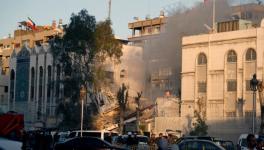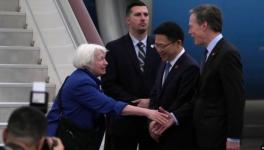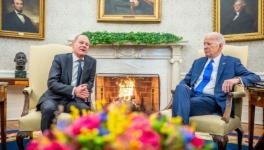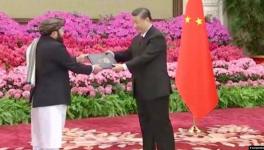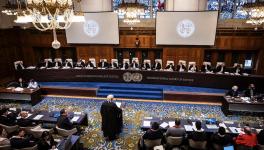A Replay of Iraq War in Syria?
The United States has provided more arms to the rebel groups claiming that the Syrian government has used chemical weapons against the militants.
The rhetoric on Syrian chemical weapons is similar to the false charges against Iraq on WMDs in the run-up to the 2003 US-led invasion. The investigations of the UN Human Rights Committee have reported that it cannot confirm the US claim on Syria chemical weapons. Russia and China have made clear that any attempt at a replay of Iraq or of Libya will not be allowed through the UN Security Council.
Newsclick talks to Vijay Prashad, eminent writer and commentator, on the developments in Syria. Prashad says that the policy of the US and the Nato powers, it seems, is to bleed Syria to ultimately weaken the Hezbollah and Iran.

Prabir Purkayastha (PP): Hello and welcome to Newsclick. Today we have with us Prof Vijay Prashad of Trinity college. Vijay we are looking at Syria and as you can see we already have again the drumbeats of war talking about chemical weapons, evidence of chemical weapons use, though they themselves had admitted that the chain of evidence is not there and various other people have questioned that claim. Do you think this issue of chemical weapons (weapons of mass destruction) is a replay of Iraq war and how credible is it given America's record to bring this up again and again.
Vijay Prashad (VP): Well, unfortunately, a lot of people have very short memories. So its not .....
PP: But Vijay, not the rest of the world.
VP: Well, I mean I'm afraid that the rest of the world, most of the media just sort of reports that the United States of America now says that they have accepted the European view that chemical weapons were used. Very rarely then do you get the next paragraph where they go and ask somebody “how credible is it ?” that the United States is going to be right on the Syrian story particularly given that the very weak, where the United States has said that we accept the European view that chemical weapons were used, the United Nations released its own statement saying that there is no evidence one the one hand, that chemical weapons were used by any side or the other and secondly the UN Human Rights Council released its fifth report which is a very important report where they said that the fighting in Syria has metastasised in a way in such a direction that IT is impossible to demonstrate where war crimes are happening and by whom. And I think that's very important. In other words, unlike in Iraq and unlike in Lybia, the United Nations is not only baulking at being pulled by the ear into a war, but they are themselves reporting quite forthrightly saying “look we don't think this is the situation”. You know, if you remember that in Lybia the head of the UN Human Rights Council Navi Pillay was one of the loudest voices calling for a no fly zone you now when she well knows that a no fly zone means aerial bombardment.
PP: It's an act of war
VP: It's an act of war she well knows that, in Lybia she was far ahead of most of the European countries in calling for a no fly zone. When the fifth report of the Human Rights Council was released, Navi Pillay in her press conference made two important points. One, she said that it is inconceivable to have a no fly zone, secondly she said that the suffering is so great (UN numbers 93,000 dead and 6.8 million refuges) that the only plausible direction to go in is a political settlement. So all I'm saying is, yes, the United States has no credibility when it starts talking about use of chemical weapons etc., but unlike the Iraq and Lybia scenario, the United Nations agencies are not so willing to join the drumbeats; at the same time the Russians and the Chinese, of course, have said that any attempt at a replay of Iraq or of Lybia will not be allowed through the United Nations Security Council. So, despite the kind of language used by the White House, the context today is very different.
PP: That certainly is a part of it and Ban-Ki-Moon has also not been very happy about the talks of arming the rebels and that's quite strange because he has been a docile follower of the United States and so on. So there seems to be a little bit of, shall we say, independent positioning of the United Nations which was deeply compromised with what happened in Lybia and earlier in Iraq. But two important things. One is the EU has said that the embargo is dead and that therefore they are willing to arm the rebels. Secondly, before Obama is meeting Putin to discuss what's going to happen, also in which Syria is a topic for discussion,Geneva 2 is on the agenda, he comes out to say that we will start supplying arms and already those arms have actually started making their appearances in Syria. Do you think this is also because they want to redress the military balance between the rebels and Bashar al-Assad's forces,very clearly the government is today dominating militarily and therefore they would like to reddress it before the Geneva conference takes place, if it at all does?
VP: Well, let's take both of them, one by one. First, the European issue. The Europeans had an embargo on arming both sides in the Syrian conflict and the embargo was to end this year, this month. What has happened is they have not been able to have an agreement among the European countries, a section of European countries want to renew the embargo, they are not happy with moving towards arming the rebels.
PP: They have also said that it's a violation of human rights and various other protocols and so on.
VP: Absolutely, so there is a divide in the European Union and the safest policy direction, because there was a divide, was to simply allow it to lapse and therefore have no combined European position and to allow the member states of the European Union to act independently.
PP: England and France both have said that they are willing to supply weapons.
VP: Correct, but the French at the same time are speaking out of two sides of their mouth because on the one side, they are saying we want to supply weapons and then on the other side, they are saying there can be no, no fly zone without a UN Security Council resolution. In other words, what they are saying is we would like to supply people on the ground, but the people on the ground are facing an air force that is attacking them. We are therefore going to supply them to continue their war effort which is relatively quixotic, given the fact that they are unable to actually match the Assad regime army and we are not going to help them on the air so you know one has to understand now what is the position of these European countries that want to go so far with the rebels, but not far enough for the rebels. This is a similar position that the United States has taken, they would like to go far enough to continue to bleed and destroy Syria, far enough to draw Hezbollah into the conflict and attempt to weaken Hezbollah but not far enough to move the rebellion into the phase where it can knock out the Assad regime. It seems that the policy that the French and the Americans etc., unarticulated policy, is not actually about getting rid of the Assad regime nor is it about bringing the rebels into power in Damascus. It appears that the policy is to simply bleed Syria. There is no other explanation for the way in which they have articulated their military support of the rebellion.
PP: Do you think their basic aim is to weaken the Hezbollah-Iran axis in which Syria, of course, is a very important element because that's how the supply line goes to Hezbollah and by weakening Syria to gain an advantage over the Hezbollah-Iran-Syria alliance?
VP: I mean its very clear, the people of United States has openly said that you know there needs to be some move to weaken Hezbollah, there's a great deal of pressure inside Lebanon to push Hezbollah to a weaker position than it is now, the constitutional debate inside Lebanon is also around the question of Hezbollah and arms and that is being pushed from the US embassy. So from all directions, there is a move to weaken the so-called Hezbollah-Iran-Iraq axis. I'm not comfortable characterizing it like that because Hezbollah has a very proximate political agenda and that is to protect Lebanon from attack by Israel, that is their reason for existence and the reason Hezbollah has, kind of entered the Syrian conflict isn't because it wants to take a position for or against or with this side or that side, but Hezbollah understands that its corridor to arms and to logistics runs through Syria, through Iraq into Iran.That is a practical problem that Hezbollah faces. So Hezbollah is not really part of an Iran axis to dominate the region. It has a very narrow frame of reference. It is the resistance against Israeli exersion, north into Lebanon. That's the reason why Hezbollah has made its political calculations. The United States and Israel, have for a very along time been basically committed to weakening Hezbollah deeply and this I think is a very smart strategy that they have. It's very interesting that when Susan Rice was the US ambassador at the UN, she would get very upset when the Russians or the Chinese would veto resolutions. In fact in one meeting she said what you have done is disgusting; language that one generally doesn't hear from upper level diplomats and at the time my sense was that she really didn't have in her briefing book a straightforward policy from the United States in the UN. You know they didn't want to come out there and say that we have to go all-out to overthrow the Assad regime or we have to go all-out to support the rebels, etc. It was a very bizarre kind of policy position that they took. Infact I had a feeling then that they enjoyed hiding behind the Russians, allowing some of the stuff to be vetoed because their policy appears to be rather than bringing the Muslim brotherhood to power in Damascus. The policy, it seemed is to weaken Hezbollah, to weaken Syria and to weaken Iran. That is basically the game.
PP: Let's look at the other part of it. While weakening, they are also opening the Shia-Sunni conflict in this region and that is a very dangerous strategy for the long run because unity as we know, amongst the people is easy to break, fractures are easy to create but very difficult to contain and on the long run take time to the path of peace. We have seen what happened in Iraq where you had virtually zones formed which earlier did not exist like Shia-Sunni zones, all this is now what they are really planning in Syria, so it all seems like a really cynical policy of divide in order to let Israel rule that seems to be the game plan that they have and it seems clear with the way they are taking about really arming what they call the Sunni majority and talk about the kind of language you have seen coming from the rebel side including cannibalism and the talk about the need for the satanic forces to be destroyed and killed and so on, which is a very dangerous move and may appear in the short run to be smart militarily but in the long run is something that cannot be contained in the region
VP: Oh, it's extremely dangerous cause. I wouldn't talk about Iraq in the past tense because a consequence of this kind of three year bleeding of Syria has meant that. Now Syrian refugees are entering Iraq where the sectarian conflict has picked up again and you know the Americans may feel like we can bleed these countries and weaken Hezbollah etc, but what I think what they have suddenly realised is that they may also be weakening one of their closest Arab allies in that immediate region and that's Jordan. That is the reason why the American administration has begun to speculate about a no- fly zone in Jordan. Apparently batteries of patriot missiles are already in Jordan, apparently American planes are already in Jordan, already patrolling the skies because the fear is sometime next year very large sections of the Jordan population, something like 40% of Jordan's population is going to be Syrian refugees and the Jordan monarchy is greatly stressed. Its collapse would be catastrophic for American policy in the region. It has relied on Jordan as a major ally, you know they think they are playing some kind of bloodless chess game for themselves and other people are bleeding while they are playing these very cynical policies, whether its about Israel or whether its about this kind of global fantasy over Iranian expansionism, whatever this might be, the fact is blood is being spilled inside and around Syria and even American pillars such as Jordan are greatly threatened and hence now we can talk about these no fly zones which you know is not a no fly zone, its an act of war and even worse, the Russians have sent S300 missiles to the Syrians which means if America forcibly pushes a no fly zone, then the Syrians may use some of those missiles. You know we are back to the Russian US cold war kind of situation which would be catastrophic not just for the region but for the world and I don't understand how there can be such a cavalier position taken by the West on what's happening there. Unless they have no concern for the long term health of West Asia and indeed for new forms of stability that are indeed emerging in the global stage; they seem to say we are going to go down fighting and this has been a mark of history when empires collapse they rarely collapse peacefully, they collapse catastrophically and I fear this is one of those kind of last growns of the American empire and as it collapses it wants to go down catastrophically.
PP: Thank you Vijay. It is really difficult to make sense out of the kind of policies the US administration is following, except to think that its really - let's look after today and forget about what is going to happen tomorrow for the region at least, if not for the United States. Thank you very much, we will keep monitoring what's happening in West Asia and hopefully discuss with you further these issues.
VP: Thanks
Get the latest reports & analysis with people's perspective on Protests, movements & deep analytical videos, discussions of the current affairs in your Telegram app. Subscribe to NewsClick's Telegram channel & get Real-Time updates on stories, as they get published on our website.










